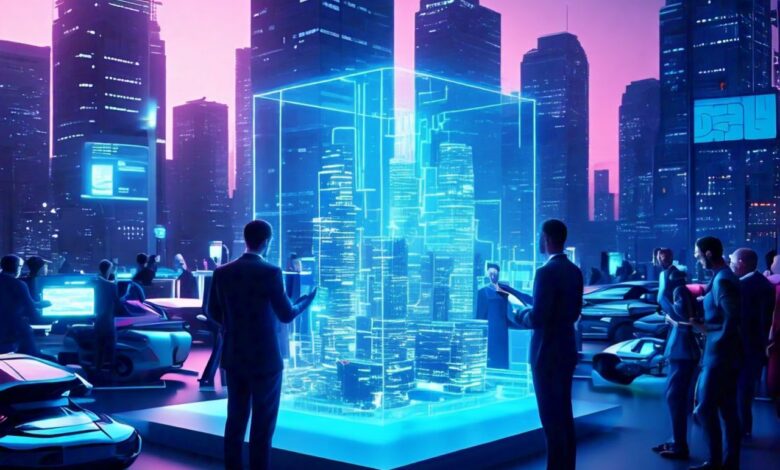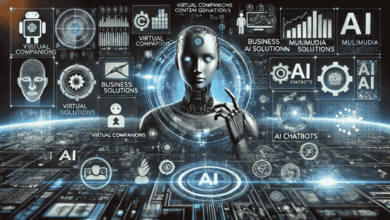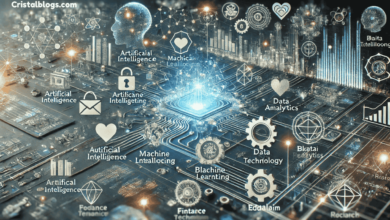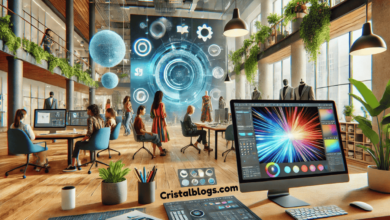From Science Fiction to Reality: How Artificial Intelligence is Reshaping Every Facet of Modern Life

Artificial Intelligence (AI) has transitioned from the realm of science fiction into an integral part of our daily lives. From voice assistants to self-driving cars, AI is no longer an abstract concept but a transformative force driving innovation across industries. This article explores how AI is reshaping modern life, making the futuristic visions of yesterday a tangible reality today.
AI in Healthcare
One of the most profound impacts of AI is observed in healthcare. AI algorithms can analyze vast amounts of medical data to identify patterns, predict diseases, and recommend personalized treatment plans. For instance, AI-powered diagnostic tools are revolutionizing how doctors detect conditions like cancer in their early stages, significantly improving patient outcomes. Furthermore, robotic-assisted surgeries are enhancing precision, reducing recovery times, and minimizing risks.
AI also plays a critical role in mental health, with chatbots and virtual therapists offering support to those in need. These tools, powered by natural language processing (NLP), provide a more accessible and affordable option for mental health care.
AI in Education
Education is undergoing a digital transformation thanks to AI. Adaptive learning platforms use AI to tailor educational content to individual students’ learning speeds and styles. This personalization ensures that each student receives an optimal learning experience, bridging knowledge gaps more effectively than traditional methods.
Virtual tutors and AI-driven tools are also assisting teachers by automating administrative tasks like grading and attendance tracking. With these tasks handled by AI, educators can focus on fostering creativity and critical thinking among their students.
AI in Entertainment
The entertainment industry is leveraging AI to craft personalized experiences for consumers. Streaming platforms use AI algorithms to analyze viewer preferences and recommend content tailored to individual tastes. Similarly, AI is revolutionizing video production, enabling creators to produce high-quality videos with minimal resources.
For instance, an AI video maker app simplifies the complex process of video creation, offering features like automated editing, voice-overs, and special effects. This innovation democratizes video production, empowering individuals and small businesses to create professional-quality content effortlessly.
AI in Transportation
Self-driving cars are perhaps the most recognizable example of AI in transportation. These vehicles rely on AI to process data from sensors, cameras, and GPS to navigate roads safely and efficiently. Autonomous vehicles promise to reduce traffic accidents caused by human error and enhance mobility for those unable to drive.
AI is also optimizing public transportation systems. Predictive analytics help manage schedules, reduce delays, and improve passenger experiences. AI-powered ride-sharing platforms use real-time data to match drivers with passengers, optimizing routes and minimizing wait times.
AI in Retail and E-commerce
AI is transforming the retail landscape by enhancing customer experiences and streamlining operations. In e-commerce, AI-driven recommendation engines suggest products based on browsing history, preferences, and purchasing behavior, increasing customer satisfaction and sales.
In physical stores, AI-powered systems analyze shopper behavior to optimize store layouts and inventory management. Contactless checkout systems, powered by AI, are creating frictionless shopping experiences, allowing customers to make purchases without waiting in line.
AI in Communication
Natural Language Processing (NLP) has revolutionized the way we communicate. AI-powered tools like chatbots and virtual assistants can understand and respond to human language, enabling seamless interactions. Businesses use these tools to provide 24/7 customer support, improving efficiency and satisfaction.
One notable advancement is AI text to speech technology, which converts written text into natural-sounding audio. This innovation is enhancing accessibility for individuals with visual impairments and enabling hands-free communication in various settings. The technology is also finding applications in content creation, enabling more engaging audio experiences for diverse audiences.
AI in Finance
The financial sector has embraced AI to enhance security, optimize operations, and improve customer experiences. Fraud detection systems powered by AI analyze transaction patterns to identify suspicious activities in real time, safeguarding assets and personal information.
Robo-advisors are another AI-driven innovation, providing personalized investment advice and portfolio management. These tools use algorithms to analyze market trends and recommend strategies tailored to individual financial goals. AI also streamlines credit scoring, making it more efficient and inclusive.
AI in Environmental Sustainability
AI is playing a pivotal role in addressing environmental challenges. Smart grids powered by AI optimize energy distribution, reduce waste, and promote the use of renewable resources. AI algorithms analyze climate data to predict weather patterns, aiding in disaster preparedness and resource management.
In agriculture, AI-driven tools enhance crop monitoring, pest control, and irrigation, helping farmers increase yields while reducing environmental impact. These innovations contribute to sustainable practices and food security in a rapidly changing world.
Ethical Considerations and Challenges
Despite its transformative potential, AI raises ethical questions and challenges. Issues like data privacy, algorithmic bias, and job displacement demand careful consideration. Ensuring transparency and accountability in AI systems is crucial to building trust and mitigating risks.
Moreover, as AI systems become more autonomous, the need for robust regulations and ethical guidelines becomes imperative. Addressing these challenges will require collaboration between governments, businesses, and researchers to ensure that AI benefits society as a whole.
The Road Ahead
The journey of AI from science fiction to reality is far from over. As AI continues to evolve, its potential to reshape our lives grows exponentially. The integration of AI into every facet of modern life demonstrates its capacity to solve complex problems, enhance efficiency, and create new opportunities.
By embracing AI responsibly and addressing its challenges, we can harness its power to build a future that reflects the best of human ingenuity and innovation. The transformative impact of AI is undeniable, and its story is just beginning.




